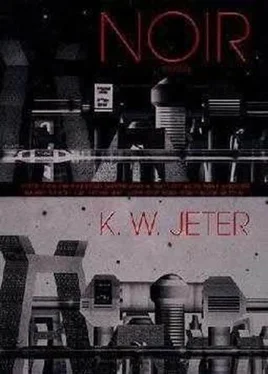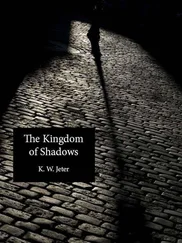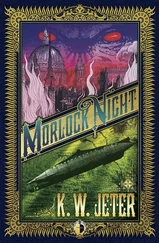K Jeter - Noir
Здесь есть возможность читать онлайн «K Jeter - Noir» весь текст электронной книги совершенно бесплатно (целиком полную версию без сокращений). В некоторых случаях можно слушать аудио, скачать через торрент в формате fb2 и присутствует краткое содержание. Жанр: Фантастика и фэнтези, на английском языке. Описание произведения, (предисловие) а так же отзывы посетителей доступны на портале библиотеки ЛибКат.
- Название:Noir
- Автор:
- Жанр:
- Год:неизвестен
- ISBN:нет данных
- Рейтинг книги:5 / 5. Голосов: 1
-
Избранное:Добавить в избранное
- Отзывы:
-
Ваша оценка:
- 100
- 1
- 2
- 3
- 4
- 5
Noir: краткое содержание, описание и аннотация
Предлагаем к чтению аннотацию, описание, краткое содержание или предисловие (зависит от того, что написал сам автор книги «Noir»). Если вы не нашли необходимую информацию о книге — напишите в комментариях, мы постараемся отыскать её.
Noir — читать онлайн бесплатно полную книгу (весь текст) целиком
Ниже представлен текст книги, разбитый по страницам. Система сохранения места последней прочитанной страницы, позволяет с удобством читать онлайн бесплатно книгу «Noir», без необходимости каждый раз заново искать на чём Вы остановились. Поставьте закладку, и сможете в любой момент перейти на страницу, на которой закончили чтение.
Интервал:
Закладка:
• fast food in self-heating structural-foam containers, with full-motion figurines from this week’s disnannie dancing on top;
• collect-the-set chocolate bars with the twenty-sixth and twenty-seventh installments of an updated Story of Job on the wrapper, the little 3-D panels filled with images of a multi-car pileup on some anachronistic freeway and garishly bright blood pooling on the floor of a hospital triage room;
• postliterate romance novels with audio chips sighing and moaning in synch with the nearest ovulation cycle that the built-in hormone sensors could pick up.
Downscale consumer goods, effluvia from the cheap-’n’-nastiverse, glittering with an enticing pseudo-life. Which was already dying, even before the tiny microbatteries, lightsucks, and other power sources could be exhausted. McNihil looked at the bright things that he had carried down here, and saw them visibly fading, the little dancing figures hobbled in their paso dobles and quadrilles, slowing down and going inert in hunched-over postures, like a miniature gallery of terminal osteoporosis.
He gazed down into the illusory depth of the romance covers, like windows into a nobler, more sun-filled world, tilted ninety degrees and laid out flat. The optic traps caught sight of his irises and responded by deepening the images, the red-streaked oceans stretching out even farther to impossible sunsets, the great doors of the Regency ballrooms swinging open to reveal curve-swept grand staircases, high arched windows overlooking Capability Brown gardens silvered with perfect moonlight. Designed to entice: a part of McNihil wanted to dive into those soft vistas and fall gravityless through them forever. But even as he looked into them, the liveried, bewigged footmen holding back the brocade curtains were growing old and shriveled, their faces crepe-paper masks. The buccaneer oceans filmed over with toxic oil slicks, the slow waves washing anoxic, aborted creatures against the ships’ rotted wood. Lovers gazed into each other’s hollow eye sockets, yellowed skull-teeth visible through the papery skin of their withering faces. Their embraces had become huddling refuges from the chill winds sliding through broken glass and brownly corrupted palm fronds; their kisses had been delayed too long, and now could only be consummated in the skin-deep grave between their hearts.
McNihil’s dead wife brushed a hand across the once-bright things he had brought her. ”I don’t really know why you do this, though.” The cigarette in her other hand continued to burn on its own, maintaining its brief spark of life. “It must be sad for you. You come all this way, and you give me this stuff… and look.” She pushed one of the fast-food containers with the tip of a thin finger. Its imbedded power sources had already run out of juice, leaving the cartoon images gray and drained of what little pseudo-life they’d had. A slow shake of the head: “That’s what happens down here.” McNihil’s dead wife looked up at him. “That’s what happened to me. Isn’t it?”
He said nothing to contradict her, though technically she was wrong. The once bright and now fading bits of the other world-their life, or imitation of such, had still been in motion when McNihil had crossed the border of this territory. Whereas she’d been dead already when she’d been brought here, her lungs gutted out by viral mesothelioma to the point where that other world’s life-support machines-what a laugh-hadn’t been doing anything more than inflating, deflating, reinflating a cold flesh balloon with her empty-eyed face attached.
“It didn’t happen to you,” lied McNihil. “You didn’t fade.” The impulse hit him, to sweep the rapidly dulling trash from the table with his forearm. “You’re still beautiful.”
She smiled indulgently. “In my way, I suppose.” She put the cigarette to her pale lips, though the smoke wasn’t drawn in, trickling slowly by her ashen cheek instead. “How does the old poem have it? The Coleridge-is it ‘Life-in-Death’ or ‘Death-in-Life?’”
“I don’t remember.” Though in fact, he could hear some of the lines being recited in his head. Her lips were red, her looks were free, / Her locks were yellow as gold: / Her skin was white as leprosy, / The nightmare Life-in-Death was she, / Who thicks man’s blood with cold … If McNihil looked at her in a hard way, without the blurring overlay of memory, that was what she reminded him of. It wasn’t pleasant; he preferred to let his mental vision go subtly out of focus, to turn his head and see, from the corner of his eye, something closer to the woman who was alive in the unforgotten past.
“You didn’t come down here to discuss poetry. At least, not this time.” McNihil’s dead wife leaned an elbow on the wobbling table. Gray ashes drifted across the stricken lovers on the romance novels. “You’re in trouble, aren’t you?”
That was how it was, dealing with the dead; they always knew stuff. The virtue, the advantage of death; their vision wasn’t occluded, betrayed by simple things like memory, dreams, hope. McNihil wasn’t the first to discover that the dead were wired into cold reality, in a way that the living could never be.
The entire economy of the dead-the indeadted-and of the dead territory in which they existed, depended on that relationship. Which varied: there were high-functioning corpses such as McNihil’s wife, and low-level scrabblers such as the ones he had seen from the window of the train coming down here. A lot resulted from whatever shape the particular deceased was in when the reanimating transition was made. If some poor bastard had scoured out his neural pathways with various pharmaceuticals, reduced the cortex in his skull to a red sponge squeezed down to its last endorphins and catecholamines, then all the batteries and add-on sensors and motivational prods that could be retrofitted onto his chill-cased spinal column weren’t going to make him into anything more than a shambling scrap-picker. The little scattered herd of unfortunates out along the tracks used their low-grade but effective skills to pluck out recyclable metals or anything else of possible value from the rubbish heaps that the garbage-laden trains dumped off twice a day. Cheaper to let the idiot dead scavenge and collect, in their slow, hunched way, than spend the money for automated scanning machinery to do the same thing.
Which proved that being in trouble was a relative thing. McNihil felt an old horror, familiar enough to be almost comfortable, deep at the floor of his gut, when he saw the pickers and scavengers going about their black-fingered rounds, like crows minus even a bird’s intelligence. But they didn’t seem to mind it. Rooting around for scraps of aluminum foil, the still-shiny tracings off busted circuit boards, probably didn’t even bring in enough to service the interest on whatever debt load they had died carrying. “Died” in that other world, the one the officially living inhabited. So most of them-short of coming across some lucky find, maybe an ancient collectible Lone Ranger and Trigger lunch-box at the bottom of some unexplored slag-pile-were actually just scrabbling themselves deeper into debt, becoming more truly indeadted with every bent-spined raking of splintered fingernails across the mulching discards of the world they were no longer part of.
They could go like that for decades, McNihil knew. With no cellular regeneration, the scavengers would wear away their hands against the corrosive, sharp-edged trash, until they were poking through it with the stumps of their forearms, their backs permanently fused into perfect half-circles. And beyond: dismaying rumors circulated, of the torsos of unlucky deadtors scrubbed free of all limbs, chests dryly flayed to breastbones and spidery ribs, the exposed batteries draining down to the last feeble amperage fraction.
Читать дальшеИнтервал:
Закладка:
Похожие книги на «Noir»
Представляем Вашему вниманию похожие книги на «Noir» списком для выбора. Мы отобрали схожую по названию и смыслу литературу в надежде предоставить читателям больше вариантов отыскать новые, интересные, ещё непрочитанные произведения.
Обсуждение, отзывы о книге «Noir» и просто собственные мнения читателей. Оставьте ваши комментарии, напишите, что Вы думаете о произведении, его смысле или главных героях. Укажите что конкретно понравилось, а что нет, и почему Вы так считаете.












